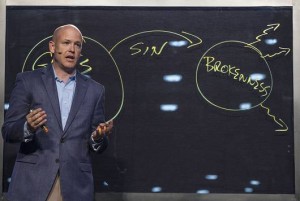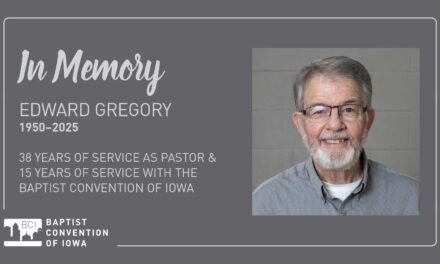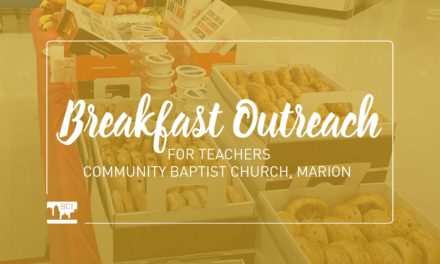by Adam Miller

Jimmy Scroggins, pastor of First Baptist Church in West Palm Beach, Fla., presented an evangelistic conversation guide he uses with unchurched people in South Florida during the North American Mission Board report at the Southern Baptist Convention annual meeting June 10. The guide involves a drawing of three circles that illustrates the Gospel. Ezell introduced a smart phone app that includes an interactive version of the diagram to use in evangelistic conversations. Photo by Matt Miller.
BALTIMORE (BP) — North American Mission Board President Kevin Ezell exhorted messengers at the 2014 Southern Baptist Convention Annual Meeting to join in reaching communities for Christ through “Gospel conversations.”
“We have much to celebrate, but there is still much to be done,” Ezell said.
Among the most pressing of tasks for Southern Baptists and evangelicals is that of individual believers living a life on mission — sharing the Gospel in their communities.
Ezell said he and other Southern Baptist leaders are grieved by the number of baptisms being reported among churches in North America. Despite some years of increase, overall population growth has dramatically out-paced baptism rates.
A decrease in baptisms is the impetus behind NAMB’s introduction of the “3 Circles” evangelism tool developed at First Baptist Church of West Palm Beach, Fla., led by pastor Jimmy Scroggins. Scroggins joined Ezell during NAMB’s presentation to share about the simplicity of Gospel conversations.
Now incorporated into a mobile app and printed and distributed as the “3 Circles: Life Conversation Guide,” NAMB’s evangelism guide offers all believers a simple and versatile tool for presenting and explaining the Gospel in every-day conversation.
Evangelistic church planting
An emphasis on evangelism and a laser-like focus on evangelistic church planting, Ezell said, is how Southern Baptists can hope to see a shift in North America’s understanding of and response to the Gospel. Thus far the response has been encouraging.
Ezell reported that of 943 churches started in 2010, 856 (91 percent) are still thriving. In the most recent year of reporting they baptized 3,394 people, grew in membership by 20 percent and gave $2.9 million toward mission efforts.
In 2013, Ezell said Southern Baptists added 1,105 congregations in North America, including 936 church plants — more than half of which are non-Anglo congregations.
“If we’re serious about reaching North America, we need to reflect the diversity and background of the people we hope to reach,” Ezell said as he shared NAMB’s appointment of church planting catalysts to help facilitate church planting among three of North America’s largest ethnic groups — Hispanics, Chinese and Koreans.
Achieving the impossible
Among the greatest stories of people reaching their own community is that of Montreal native David Pothier at La Chapelle church, a congregation of more than 700, Ezell said. Not only did the church reach hundreds of people, but last year they baptized 100 — in a city many may consider decidedly secular.
“Montreal is by far the most challenging of all [Send North America] cities,” Ezell said. “It’s perhaps the most spiritually dark place in North America.”
Joining Ezell onstage were La Chapelle church planter David Pothier, a native of Montreal, and new believer Cedric Dumoulin, who visited the church for the first time at the invitation of a friend.
Dumoulin did not come as result of outreach methods at La Chapelle. He came because of a friend, and he stayed because of the church’s welcoming and worshipful environment.
“From the first music notes I felt the presence of God for the first time, and during the message all the deepness of my soul was touched. It led me to read Scriptures, find God and find life in God,” Dumoulin said. “When God arrived in my life everything changed. Now I want to live for God. Not just with God but for God.”
Church revitalization
Last year, church planter Brad O’Brien moved to Baltimore to start Redeemer City Church, which meets in the once-thriving Lee Street Memorial Church building.
With Lee Street on the decline, lay leader Raymond Hoffman, a member of the church for 61 years, began meeting with O’Brien about bringing life to his church. Gradually the two decided to build two churches into one. Lee Street and Redeemer became Jesus Our Redeemer Church late last year.
Emphasizing the need to revitalize churches in all the Send North America cities, Ezell introduced messengers to Hoffman, O’Brien and O’Brien’s wife Jena-Marie.
“Only 10-15 percent of our churches are healthy, and another 70-75 percent are plateaued or declining,” Ezell said. “It’s amazing what God can do when churches are open to whatever God can bring before them.”
Jesus Our Redeemer is now thriving and is reaching its neighborhood one Gospel conversation at a time.
Hoffman says of his once-dying church, “Every Sunday is different. The spirit is good; the people are loving. It’s a peaceful place to go. On Saturdays I walk around edgy because I want Sunday morning to come so I can get to church early.
“I love [O’Brien],” Hoffman added. “I’d follow him in whatever he wants to do.”
Earlier in his report Ezell paid tribute to the leaders of Baptist state conventions in the South through whose leadership church planting funds have been allocated to places such as Baltimore and other North American cities, where churches are scarce.
Ezell said a new funding model these leaders adopted will put $8 million annually into non-South regions.
“I’m grateful for the leadership of these men. I’m grateful for their friendship. And I’m grateful for their sacrifice,” Ezell said.
Ezell closed the presentation by sharing how a man he never knew led a conversation that altered the course of his life.
“Bill Sullivan is not a pastor that you’ve heard preach at a conference,” Ezell said. “Bill Sullivan never wrote a book. Bill Sullivan shared a Gospel conversation with a young 26-year-old. Bill Sullivan shared the Gospel conversation with Mike who was married to Glenda. They both became believers. They had three children and 13 grandchildren. My life was changed because of that, because that 26-year-old Mike was my dad.
“My dad passed away February 13, and as I reflected on that day at my dad’s funeral I was so grateful for a Southern Baptist layman I don’t even know who took the time to have a Gospel conversation with my father.
“We’ve got to be a people who are about sharing our faith,” Ezell said.
View videos and a photo gallery of the NAMB presentation at namb.net/SBC_2014.
Adam Miller writes for the North American Mission Board.








